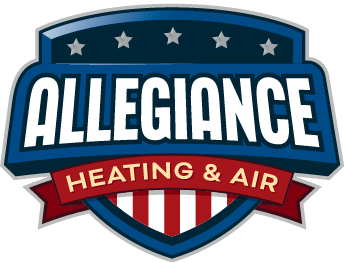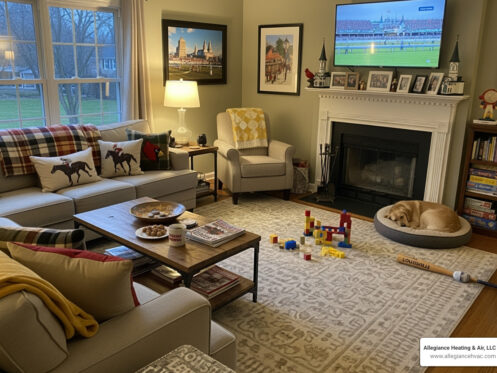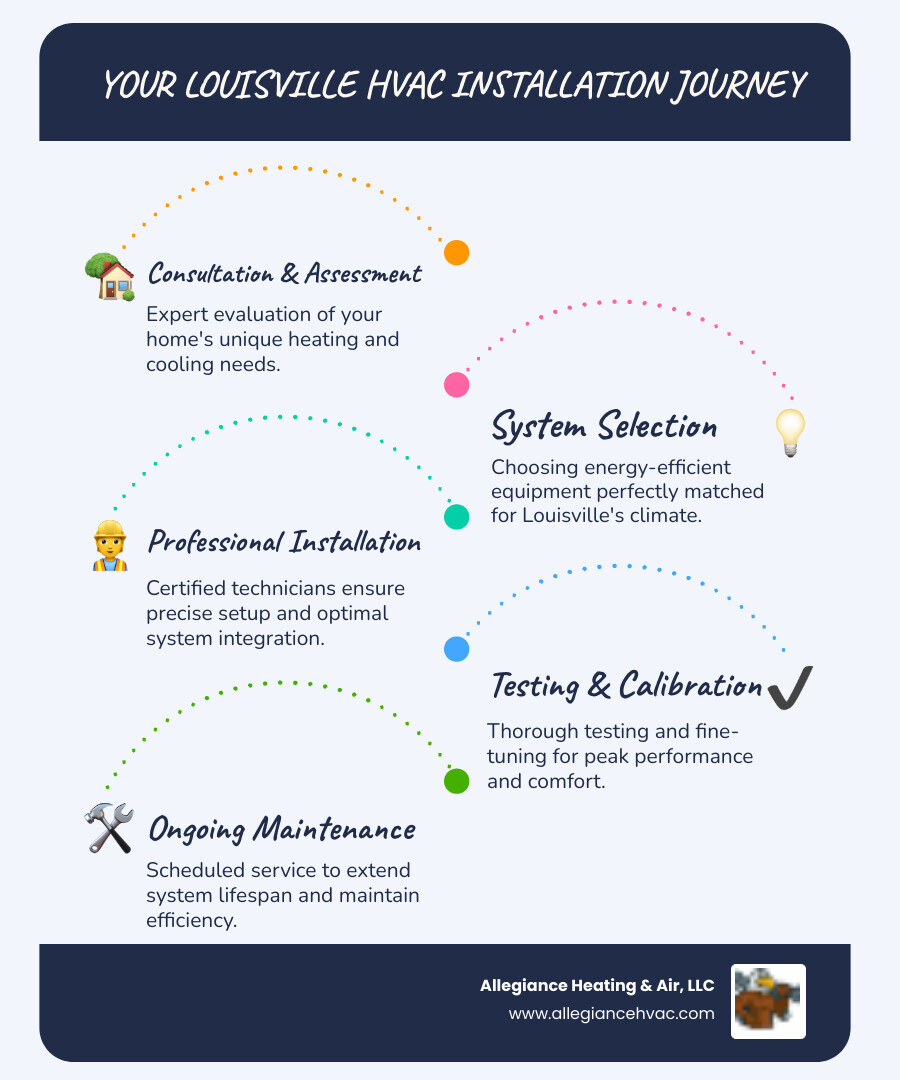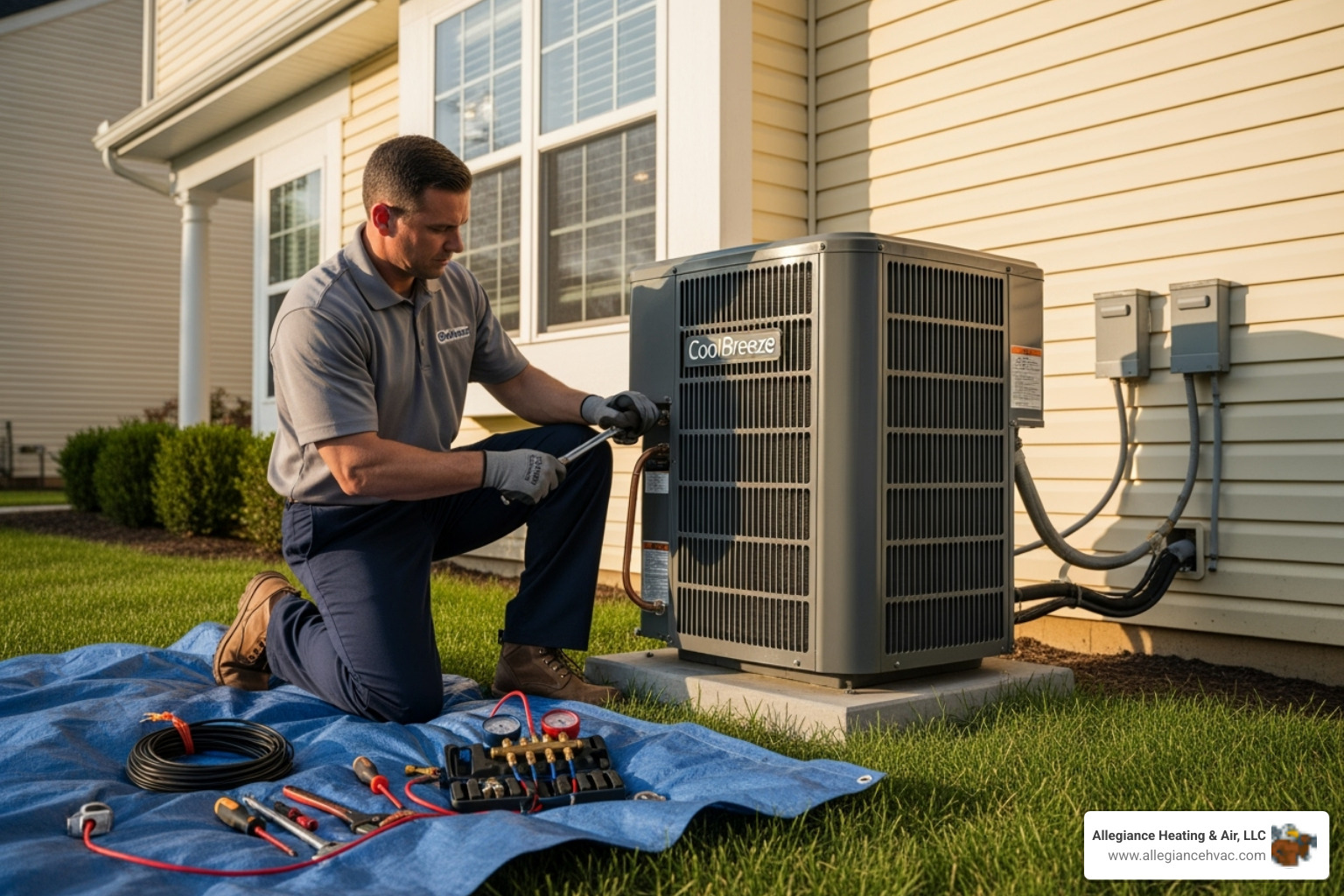Why Louisville’s Unique Climate Demands Expert HVAC Installation
Louisville HVAC installation requires careful planning and professional expertise to handle the city’s demanding climate conditions. With average high temperatures reaching 89°F in July and winter lows dropping to 27°F in January, your home’s heating and cooling system works year-round to maintain comfort.
The Louisville HVAC Installation Process:
- Initial consultation – Professional assessment of your home’s needs
- System selection – Choosing equipment suited for Louisville’s climate
- Professional installation – Certified technicians ensure proper setup
- System testing – Calibration for optimal performance
- Ongoing maintenance – Regular service to maintain efficiency
Louisville’s climate creates unique challenges for HVAC systems. The hot, humid summers strain air conditioning units, while cold winters demand reliable heating. One local homeowner finded this when their AC broke down “the night before a major family event” during Louisville’s sweltering summer heat – a situation that could have been avoided with proper system selection and professional installation.
Professional installation matters because it ensures your system can handle Louisville’s weather extremes. DIY installations often result in improper sizing, poor ductwork connections, and voided warranties. With annual energy costs ranging from $1,500 to $2,500 in Kentucky, getting the installation right the first time protects your investment and keeps utility bills manageable.
The key to successful HVAC installation lies in understanding your home’s specific needs, choosing energy-efficient equipment, and working with experienced local contractors who understand Louisville’s climate demands.
Choosing the Right HVAC System for Your Louisville Home
Selecting the perfect system for your Louisville HVAC installation isn’t just about picking the most expensive unit and calling it a day. Louisville’s climate throws some serious curveballs at your home comfort system – we’re talking scorching 89°F summers that make you want to live in your refrigerator, followed by bone-chilling 27°F winters that have you questioning why you didn’t move to Florida.
This roller coaster weather means your HVAC system works overtime year-round. You need equipment that can handle both extremes without throwing in the towel (or leaving you sweating through your shirt in July).
Energy efficiency should be at the top of your priority list. When shopping for systems, you’ll see ratings like SEER for cooling and HSPF for heating. Think of these like your car’s miles-per-gallon rating – higher numbers mean better efficiency and more money staying in your pocket. With Kentucky homeowners spending $1,500 to $2,500 annually on heating and cooling, an efficient system pays for itself over time.
Here’s something that might surprise you: the air inside your home can be 2 to 5 times more polluted than outdoor air. Sometimes it’s even 100 times worse! Modern homes are built tight for energy efficiency, but this can trap pollutants inside. That’s why considering indoor air quality features like advanced filtration, humidifiers, and dehumidifiers isn’t just nice to have – it’s essential for your family’s health.
For specialized heating solutions, check out more info about heat pump systems, which work great for both heating and cooling in our climate. You can also find helpful energy efficiency tips from Energy.gov to maximize your system’s performance.
Common HVAC Systems in Louisville
Central air conditioners are the workhorses of Louisville summers. These systems team up with your furnace or air handler to push cool air through your home’s ductwork. They’re reliable, effective, and handle whole-home cooling like champs when the temperature soars.
Gas furnaces are the heating heroes when winter hits hard. Natural gas burns clean and hot, making these systems incredibly effective at keeping your home toasty when it’s freezing outside. They deliver consistent, powerful heat that laughs in the face of January’s worst weather.
Heat pumps are the multi-talented performers of the HVAC world. In summer, they move heat from inside your house to the outdoors. When winter arrives, they flip the script and extract heat from outdoor air (yes, even cold air contains heat energy!) to warm your home. They’re especially efficient during Louisville’s milder spring and fall months.
Ductless mini-split systems shine in homes without existing ductwork or when you need to control temperatures in specific zones. Maybe your upstairs bedroom always runs hot, or you’ve added a sunroom that needs its own climate control. These flexible systems handle those tricky situations perfectly. Learn more about these versatile options at ductless mini-split systems.
Geothermal systems represent the premium option for long-term thinkers. They use the earth’s stable underground temperature to heat and cool your home with incredible efficiency. While the upfront investment is higher, the operational savings over 20+ years can be substantial, especially when combined with available tax credits.
Why Energy Efficiency Matters
Choosing an energy-efficient system for your Louisville HVAC installation makes sense for your wallet and the planet. Lower utility bills hit you right in the feel-good zone – every degree of efficiency translates to real savings. Setting your thermostat just one degree higher in summer can slice 6-8% off your energy bill.
Long-term savings add up faster than you might think. While high-efficiency systems cost more upfront, they pay you back through reduced operating costs over their 10-15 year lifespan. It’s like buying a fuel-efficient car – you spend a bit more initially but save money every month at the pump.
Don’t forget about rebates and tax credits that can offset your initial investment. Depending on the system you choose and current programs, you might qualify for significant financial incentives. Geothermal systems, in particular, often come with attractive tax benefits.
Beyond the money, efficient systems provide improved home comfort with more consistent temperatures and quieter operation. They eliminate those annoying hot and cold spots that make some rooms feel like saunas while others feel like ice boxes.
The Role of Indoor Air Quality (IAQ)
Louisville’s seasonal allergies can turn your home into a battleground if you don’t have proper air filtration. High-efficiency filters with good MERV ratings capture the tiny particles that make you sneeze – dust, pollen, pet dander, and other microscopic troublemakers.
Humidifiers become your best friend during dry winter months, preventing that scratchy throat feeling and protecting your wood furniture from cracking. Dehumidifiers work the opposite magic in our muggy summers, removing excess moisture that makes your home feel sticky and encourages mold growth.
UV lights installed in your HVAC system act like tiny superheroes, killing airborne viruses, bacteria, and mold spores as air passes through. Some UV systems eliminate 99% of harmful microorganisms, giving you cleaner, healthier air to breathe.
The health benefits are real and measurable. Better air quality means fewer respiratory issues, improved sleep, and overall better well-being for your family. When you consider that we spend most of our time indoors, investing in clean air makes perfect sense.
The Professional Louisville HVAC Installation Process
Getting your Louisville HVAC installation done right makes all the difference between years of reliable comfort and ongoing headaches. Think of it like building a house – you wouldn’t trust an amateur with your foundation, so why risk it with the system that keeps your family comfortable year-round?
Professional installation isn’t just about having the right tools (though that helps!). It’s about understanding how Louisville’s unique climate affects your system, knowing local building codes, and having the experience to spot potential problems before they become expensive repairs. Our certified technicians have seen it all – from homes where a previous DIY installation left ducts disconnected to systems that were completely wrong for the home’s size.
DIY risks are real and costly. Improper refrigerant levels can damage your compressor. Faulty electrical connections create fire hazards. Wrong-sized systems waste energy and leave you uncomfortable. Plus, most manufacturers void warranties if the system isn’t professionally installed. We’ve helped homeowners who learned this lesson the hard way – don’t let that be you.
Safety is our top priority during every installation. HVAC systems involve electricity, gas lines, and refrigerants – all requiring proper handling and expertise. Our team follows strict safety protocols and uses the latest HVAC technology to ensure your installation meets the highest standards.
What to Expect During Installation
Your Louisville HVAC installation journey starts with understanding exactly what’s happening in your home. During our initial consultation, we’ll sit down with you to discuss your comfort goals, budget, and any specific concerns. Maybe your upstairs gets too hot, or your energy bills are through the roof – we want to hear about it all.
The home assessment and load calculation might sound technical, but they’re actually pretty straightforward. We’re measuring your home’s heating and cooling needs based on its size, insulation, windows, and even which direction it faces. This prevents the all-too-common problem of installing a system that’s too big (which cycles on and off constantly) or too small (which never quite gets comfortable).
System selection becomes much easier once we know your home’s exact needs. We’ll walk you through options that fit your situation, explaining the pros and cons in plain English. No pressure, no confusing technical jargon – just honest advice about what will work best for your family.
On installation day, we handle the removal of your old unit carefully and dispose of it properly. The actual installation typically takes one to two days, depending on whether we need to modify ductwork or if you’re adding new features. Our team size is matched to your project’s complexity, so we can work efficiently without disrupting your daily routine too much.
System testing and calibration is where everything comes together. We check every component, test airflow, verify refrigerant levels, and make sure your thermostat is communicating properly with the system. Only when everything is running perfectly do we consider the job complete.
Key Factors for Your Louisville HVAC Installation
Proper system sizing is absolutely critical for your Louisville HVAC installation. We see too many homes with systems that are either oversized (leading to short cycling and uneven temperatures) or undersized (struggling to maintain comfort during extreme weather). Our detailed load calculations ensure your system matches your home perfectly.
Ductwork inspection often reveals surprises. Sometimes a room that’s always too hot or cold isn’t due to the HVAC system at all – it’s a disconnected or blocked duct. We thoroughly examine your existing ductwork and recommend any necessary repairs or modifications. Getting the air distribution right is just as important as having the right equipment.
Local regulations and permits might seem like paperwork hassles, but they’re actually protecting your safety and investment. Kentucky licensing requirements ensure that only qualified professionals work on your system. We handle all the permits and inspections, so you don’t have to worry about compliance issues down the road.
Our technicians meet all state certification requirements, giving you confidence that your installation will be done properly the first time. For homeowners specifically interested in heating solutions, our furnace installation page provides additional details about heating system options.
Finding and Vetting a Reputable HVAC Contractor
Choosing the right HVAC contractor for your Louisville HVAC installation is as important as choosing the right equipment. You want a partner who is knowledgeable, trustworthy, and committed to your long-term comfort. Look for companies with a proven track record, like those with “over 60 years of experience” or “over 70 years of experience” as mentioned in our research, demonstrating deep local expertise.
We pride ourselves on our trusted, customer-first service, backed by highly vetted technicians and a commitment to community involvement. When vetting a contractor, prioritize experience, certifications, and comprehensive insurance coverage.
Here are some key questions to ask a potential contractor:
- Are you licensed and insured in Kentucky?
- Do your technicians hold NATE (North American Technician Excellence) certifications?
- Can you provide references or show positive customer reviews?
- Do you offer written estimates and transparent pricing?
- What types of warranties do you offer on parts and labor?
- How do you handle emergency services after installation?
- Can you explain your process for system sizing and load calculation?
Hallmarks of a Trusted Company
A reputable HVAC company stands out through several key characteristics:
- Licensed and Insured: This is non-negotiable. A licensed contractor ensures adherence to industry standards and local codes, while insurance protects you from liability in case of accidents during the installation.
- NATE-Certified Technicians: NATE certification is a voluntary program that signifies a technician has demonstrated excellence in HVAC knowledge. It’s a strong indicator of a technician’s expertise and commitment to quality.
- Positive Customer Reviews: Online reviews are invaluable. Look for companies with consistently high ratings (like 4.8 or 5.0 stars across hundreds of reviews, as seen in our research) and positive testimonials that speak to professionalism, honesty, and quality workmanship. Anecdotes about technicians being “professional, knowledgeable, and honest” are great signs.
- Transparent Pricing and Written Estimates: A trustworthy contractor provides clear, detailed, written estimates that break down costs without hidden fees. They should be upfront about pricing and not try to upsell unnecessary services. We believe in providing free consultations and estimates so you know exactly what to expect.
- Strong Warranties: A reliable company stands behind its work. Look for comprehensive warranties on both the equipment and the installation labor. Some companies offer “up to 10-year labor warranty on eligible systems,” which provides significant peace of mind.
You can also Check a company’s BBB rating for additional insights into their business practices and customer satisfaction.
Understanding Costs and Financing
While we cannot provide specific pricing, understanding the factors that influence the cost of your Louisville HVAC installation is crucial. The total cost is influenced by several variables:
| Factor Affecting Cost | Impact |
|---|---|
| System Type & Size | The type of system (furnace, heat pump, geothermal) and its size (tonnage) are the biggest cost drivers. Geothermal is the most expensive upfront, while a standard central AC and furnace is more moderate. |
| Efficiency Rating (SEER/HSPF) | Higher efficiency units cost more initially but lead to significant long-term savings on utility bills. |
| Ductwork Modifications | If your existing ductwork needs to be repaired, resized, or extended, this will add to the overall project cost. |
| Installation Complexity | Factors like accessibility of the installation area (attic, crawlspace) and the need for electrical or gas line work can influence labor costs. |
| Additional Features | Adding advanced thermostats, zoning systems, humidifiers, or high-end air filtration will increase the total investment. |







